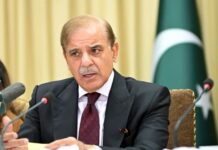ISLAMABAD: Though Ministry of Commerce (MoC) has termed the recently issued European Union’s (EU) report on the effects of Generalised Scheme of Preferences (GSP) for Pakistan 2016-2017, a balanced report, ahead of decision of EU parliament regarding the facility next month, the report asks Pakistan to ensure implementation on 27 UN conventions.
According to a fresh report of EU, there have been positive developments in strengthening the human rights framework and legislative actions on the rights of women, children, minorities and labour rights, with legislation on, inter alia, torture, juvenile justice and transgender rights in the pipeline.
However, these areas, as well as the use of torture, application of the death penalty, high prevalence of child labour and freedom of expression pose serious concerns. The overall human rights situation is therefore mixed and Pakistan must step-up its efforts to ensure enforcement and implementation of legislation.
The second GSP Plus mission noted positive institutional (e.g. establishment of the National Commission on Human Rights and a National Action Plan for Human Rights) and legislative (e.g. adoption of anti-rape and anti-honour killing laws) developments. At the same time, serious challenges related to rights of women, children and minorities, freedom of expression, the application of the death penalty, torture, and the capacity to implement and enforce legislation remain.
Regarding the implementation of the conventions UN Human Rights conventions, the report says while constitutional and legal guarantees for the rights of Pakistani citizens are relatively comprehensive, and although the last two years have seen the adoption of a number of new laws, strategies and action plans, implementation remains an issue of concern.
The EU committee also expressed concern that the Pakistani Constitution and laws do not provide a definition of racial discrimination in conformity with the convention, nor is there any specific legislation which prohibits acts of racial discrimination against individuals.
The EU committee, as the report says, also expressed concern that minorities often face violence and hate crimes, such as harassment, mob violence and killings of persons belonging to ethnic and religious minorities, particularly Hazaras, Christian Dalits, Hindu Dalits and Ahmadis.
According to the report, as per an NGO, more than 2,500 cases of serious violence against women were reported in the media in 2016. These ranged from murder, sexual violence, domestic violence, acid attacks and kidnappings to harassment.
There are serious concerns about freedom of expression, freedom of association and assembly, the situation of human rights defenders and civil society activists, and the overall ‘shrinking civil society space’.
The picture of Pakistan’s performance on human rights during the reporting period remains mixed. The lack of progress in certain areas can to some extent be explained by the many challenges faced by the government, including the difficult security situation, and the lack of resources and capacity.
Recent positive steps were taken with regards to the establishment and increased independence of national oversight bodies, as well as the introduction of new legislation, will still need time and dedicated efforts to translate into a more effective implementation of Pakistan’s human rights obligations.
Pakistan must, therefore, step up its efforts and take more proactive, sustained and forceful action to implement legislation and to address problematic areas.
Pakistan’s efforts to implement the environmental conventions have improved. There is a growing awareness with regard to the effective implementation of these conventions among civil society organisations. The judiciary has been highly critical of the Houbara Bustard hunting.
On the economic side, the report says, Pakistan’s economy is still quite dependent on agriculture, which accounts for around 25 per cent of GDP and 45 per cent of employment. Services and industry account for 55 per cent and 9 per cent of GDP respectively. Pakistan’s economy has shown signs of recovery after experiencing subdued growth rates of 3-4 per cent over the period 2011-2015 due to an energy crisis, a volatile security environment, recurring natural disasters and challenges in economic governance.
Growth is expected to further consolidate in the coming years. From 2006 to 2016, EU imports from Pakistan almost doubled from EUR 3.3 to EUR 6.2 billion. The growth of imports has been particularly fast since the award of GSP Plus to Pakistan in January 2014, with a 21 per cent increase between 2014 and 2016 in terms of GSP+ imports.
The EU is Pakistan’s first export destination absorbing around 29 per cent of Pakistan’s total exports to the world, followed by the USA (16 per cent), China (9 per cent) and Afghanistan (8 per cent). The EU is Pakistan’s third largest source of imports, after China (23 per cent) and the UAE (14 per cent), accounting for around 10 per cent of the total.
Giving his reaction to the report, Commerce Secretary Younus Dagha said that the report was balanced since the EU has admitted various steps taken by Pakistan. With the balanced report, Pakistan expects that the EU will extend the GSP facility to Pakistan. The EU parliament will decide about the facility in the mid of February 2018.
























